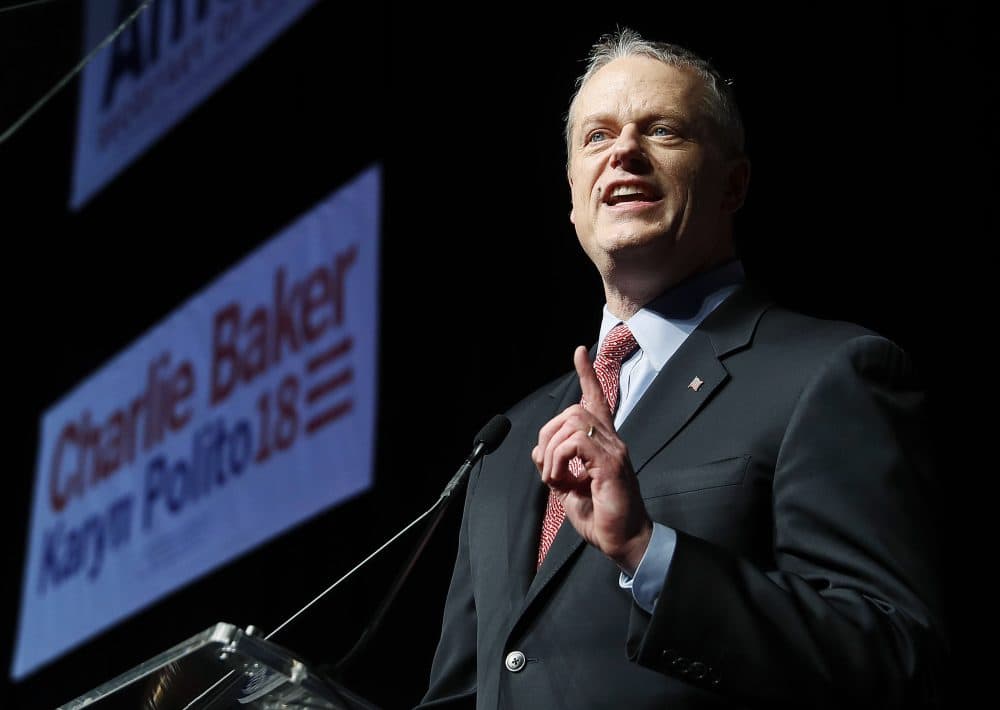Advertisement
Baker Raps Dems On Tax Hikes, But Stays Mum On 'Millionaire's Tax'

Give Republican Gov. Charlie Baker credit for having the discipline to stay on message.
No matter how many times he is asked, the governor will not take a position on a major tax increase that has been debated and advanced in two successive legislative sessions after it was put before the General Court by Raise Up Coalition activists who collected tens of thousands of signatures.
"It's not on the ballot yet," Baker said in a Sunday morning televised interview with Jon Keller of WBZ-TV. "It's not ripe yet. At some point it will be and when it is we can talk about it."
In the same interview, Baker also said, "The Democrats for the most part want to raise taxes, we don't."
It was the latest instance of Baker being asked about the long-percolating, ground-shifting tax proposal and declining to take a side, although he may have hinted at his true feelings when he said Republicans don't want to raise taxes.
Technically, Baker is correct. This year's ballot is not set, although there's been a lot of debate already about proposals on track for the ballot, including measures to cut the sales tax, raise the minimum wage, implement a paid family and medical leave program, and impose nurse staffing requirements.
In September 2015, Attorney General Maura Healey certified as ballot-eligible the constitutional amendment that would add a 4 percentage point surtax on household incomes greater than $1 million, a measure that the Department of Revenue concluded would generate $1.9 billion a year.
After the measure was advanced by Democrats in 2016 and again in 2017 — both times in the face of vocal opposition from Republican lawmakers — business groups opposed to the question challenged its ballot eligibility and a Supreme Judicial Court decision is expected soon.
If the SJC, of which Baker has appointed a majority of the seven justices, throws the question off the ballot Baker might wiggle out of the debate without ever taking a position on the measure.
Supporters say the surtax would bring fairness to the tax code and needed revenues that could be spent on transportation and education. Opponents have warned the plan will lead to an exodus of wealthier taxpayers, discourage business investment and set the stage for further income-based bracketing of taxpayers.
Asked if he was prepared to campaign against the income surtax if the SJC clears it for the ballot, Baker said, "Let's hear what the SJC does and we can have a conversation after that. I think that one is pending before the SJC for some legitimate constitutional questions and we'll see what happens with it and then we'll decide what we do about it."
When Keller asked him whether he didn't know whether he would campaign for or against the tax increase, Baker said, "It's not on the ballot yet." Pressed if there was a reason he didn't want to share his thinking, Baker reiterated his belief that the proposal "is not ripe yet."
The plaintiffs allege that the constitutional amendment impermissibly violates a constitutional provision requiring that initiative petitions only address "related" or "mutually dependent" subjects. The proposal, the plaintiffs say, combines unrelated subjects by establishing a graduated income tax structure and mandating that those funds raised through the tax increase only be spent on education and transportation.
The challenge also asks the court to toss the question on the grounds that it allegedly improperly allocates funding, allowing a "radical decentralization of fiscal policy away from the Legislature" and setting a precedent that "will set the stage for future initiatives from a range of interest groups proposing constitutional amendments segregating funds for their preferred causes, or raising tax rates on some groups and lowering taxes on others."
According to the Massachusetts Budget and Policy Center, seven states and the District of Columbia have statewide tax rates of approximately 9 percent or more for their highest income tax bracket. In a report released last month, MassBudget concluded that California and New York, the two states with the highest "millionaire taxes," have seen the greatest gains in the number of millionaire taxpayers since 2010.
"The eight millionaire-tax states together, which contained 36 percent of U.S. taxpayers, saw 37 percent of the total increase in the number of million-dollar incomes across the country," MassBudget reported. "Texas and Florida, two states with no income tax and the nation’s second and third most taxpayers, also saw large numbers of new millionaires."
Baker excited Republicans at the April 28 party convention by declaring his support for a sales tax reduction, but since then has declined to say if that means he supports an initiative petition cutting the sales tax rate to 5 percent from 6.25 percent.